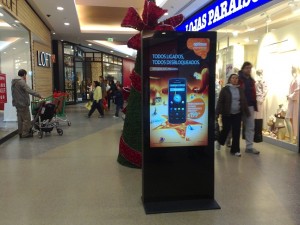Shopping is becoming more of an entertainment industry than a necessity of purchasing goods, which is where digital signage comes in. Where we were once influenced by static billboard advertisements, vibrant eye-catching digital signage screens bring a myriad of images to bombard us with the latest trends, special offers and discounts, and why we should spend our hard earned money in their store. It is an art form of entertainment, where you can watch anything from a beach scene; advertising holiday essentials (and it looks so real you could run the sand through your fingers) to persuasive advertising on a imaginative and dynamic screen, where you are influenced into purchasing a brand of trainers which are the current must-have accessory.
So where is the best position for the digital signage screens to be most effective? Obviously high-traffic areas are going to be a logical locations, but consider the prospect that it could also be a crowded and popular area, where the digital screen would be obscured from view. One of the most analytical places is around the escalator, where height offers a vantage point which can not be obscured. This is suitable for anywhere, not just shopping malls, but places like sporting venues, restaurants and hotel lobbies. Also most people look around when on an escalator, and take in their surroundings.
For an interactive and way-finding facility, the digital signage screen would be located near the entrance to the shopping mall enabling the customer to plan a route around the area, taking in the stores of interest. Clever content, within the advertising digital screen, also displays appropriate advertisements, according to the data collected from the customer. For example, a teenage girl may search for trendy clothes stores, which prompts the screen to offer promotional discount codes (or coupons), either by way of a printed ticket, a QR code or a bluetooth message, to be redeemed at the till. This can also incorporate promotions for the food outlets within the mall.
Designers have been able to incorporate digital signage screens into the fabric of the building, like encasing pillars with digital signage screens, tiled wall panels, window displays or many forms of independent floor standing kiosks or platforms: some concreted into the ground, mounted onto a pedestal or set within a frame. The design of which knows no bounds, as any style or color of frame and surround can hold an electronic advertising screen.
Audio technology can also be incorporated, which is particularly useful for people who are hearing impaired; a speaker at head height or a headphone port allows for a verbal advertisement, information, messages or routes to be broadcast. Other considerations for physically impaired customers are screens at ergonomic heights, even for wheel chair users.
Digital signage and advertising screens can be synchronized and choreographed to run simultaneously, scheduled at pre-set time intervals or run as individual and independent screens. Research over the past 5 years on digital advertising campaigns, has shown it to be one of the most successful forms of advertising ever.
